We know we should make eating vegetables a priority, yet many of us struggle with fitting enough of them into our meals. One meal that often lacks vegetables is breakfast. Although many cultures embrace vegetables for all meals, Americans have largely excluded this important food group from the first meal of the day. The typical breakfast, if eaten at all, includes highly processed items that satisfy the sweet tooth but sabotage our health. We can replace these products with whole plant-based foods that truly feed our bodies and minds. Seize the day – and your well-being — with breakfast vegetables.
We Need More Fiber
The Academy of Nutrition and Dietetics has observed that people who eat higher amounts of dietary fiber have fewer chronic diseases. Increased consumption of dietary fiber appears to lower the risk of developing type 2 diabetes, cardiovascular disease, and some cancers. Fiber intake also correlates to lower body weight. The American Heart Association suggests that we should consume 25 to 30 grams of fiber a day from a variety of food sources. However, American adults only consume 15 grams a day. Including vegetables, the first thing is an easy way to boost fiber intake and get more antioxidants, vitamins, and minerals from plant-based foods.
Savory Substitutions for Starches
Breakfast often includes a generous helping of starches that fill the stomach but may also spike blood glucose levels. Vegetables can provide longer-lasting satiety with a much smaller carb load. These foods help you control your blood sugar. A medium white potato, a favorite for hash browns and other breakfast dishes, has about 36 grams of carbohydrates. One slice of wheat bread may contain at least 14 grams of carbs. Try these satisfying, flavorful breakfast vegetable alternatives instead. Chop them into bite-sized pieces; roast or sauté.
- radishes – 2 g carbs per ½ cup serving
- cauliflower – 2.5 g carbs per ½ cup serving
- turnip – 4 g carbs per ½ cup serving
- jicama – 5.5 g carbs per ½ cup serving
- rutabaga – 6 g carbs per ½ cup serving
- butternut or acorn squash – 8 g carbs per ½ cup serving
Bell Peppers
Bell peppers are a rich source of nutrients that strengthen the eyes, brain, and immune system while fighting heart disease and cancer. Green, unripe bell peppers are readily available and ripe, sweeter versions come in red, orange, and yellow varieties. A medium red bell pepper provides only seven grams of carbohydrates but twice the recommended daily value (DV) of vitamin C, 75 percent DV of vitamin A, and 14 percent of folate. Choose organic bell peppers whenever possible. The Environmental Working Group reports that commercially grown peppers have high amounts of pesticide residue that persist after washing. A study published in the Journal of the Science of Food and Agriculture found organic bell peppers contain more antioxidants than those conventionally cultivated. Bell peppers are versatile breakfast vegetables with scrambled eggs or in omelets and quiches. Raw slices make a quick morning munch with hummus or guacamole.
Squash
Instead of filling your breakfast plate with empty carbs, calories, and sugars, load up on squashes that provide plenty of health-boosting nutrients including vitamins A and C, potassium, manganese, and fiber. Southern Illinois University reports that squash seeds have potent antimicrobial, antiparasitic, and antifungal properties. Add shredded zucchini or yellow squash to a favorite morning muffin recipe. Sautee or grill sliced or cubed squash to replace starchy potatoes.
Beans
Beans are among the most economical foods available. They are gluten-free, lower in carbohydrates, and more abundant in naturally occurring nutrients than breakfast staples like biscuits and cereals. Beans supply satiating fiber and protein that can help stave off unhealthy cravings. Have a ½ cup serving of your favorite beans with your eggs. Try different varieties of breakfast tacos and wraps. Include beans in a breakfast salad.
Sprouts
Sprouted vegetables and legumes are tiny, living plants full of health-promoting phytochemicals. Alfalfa, mung beans, adzuki beans, broccoli, radish, and cress are popular varieties of sprouts in stores. Impart life, crunch, and zesty flavor to your breakfast sandwich or wrap it with a handful of sprouts. They make for tasty toppings on omelets and stir fry dishes, too.
Fermented Vegetables
Feed your gut microbiome first thing in the morning with fermented vegetables. These foods will bring zing to your awakening taste buds and infuse your digestive tract with beneficial probiotics. Fermented vegetables are a convenient breakfast option because they are already seasoned and do not require heating. Add sauerkraut and kimchi to a breakfast scramble or burrito. Enjoy fermented carrots or green beans as a side dish with your day’s first meal.
Leafy Greens
Start the day by going green for breakfast. Dark leafy vegetables like kale, spinach, swiss chard, and romaine can pack your plate or bowl with filling fiber and a hefty load of nutritional benefits. Build a breakfast salad with raw or sautéed greens. Replace bread products with lettuce or collards for a crunchy low-carb wrap. Of course, smoothies are a quick fix for getting more greens in your diet as well.
Dips and Sauces
Adding breakfast vegetables can be as simple as garnishing a meal with a sauce or dip. Salsa can add the antioxidant benefits of tomatoes and garlic, while guacamole can provide creaminess and healthy fats. Hummus made from chickpeas or beans supplies smooth texture and fiber. These condiments go well on sandwiches, salads, and omelets. The options are limitless.
Prepping for a Healthy Breakfast
Time is often a critical issue that affects the quality of breakfast. Healthy eating calls for some planning ahead to ensure wholesome options are within reach when you need them. Sauté or roast vegetables at night to have on hand in the morning. Breakfast vegetables taste wonderful warm or cold. Consider preparing these vegetables for your next breakfast:
- Brussel sprouts
- broccoli
- cauliflower
- asparagus
- beets
- carrots
- cabbage

 Home
Home Health
Health Diet & Nutrition
Diet & Nutrition Living Well
Living Well More
More




















